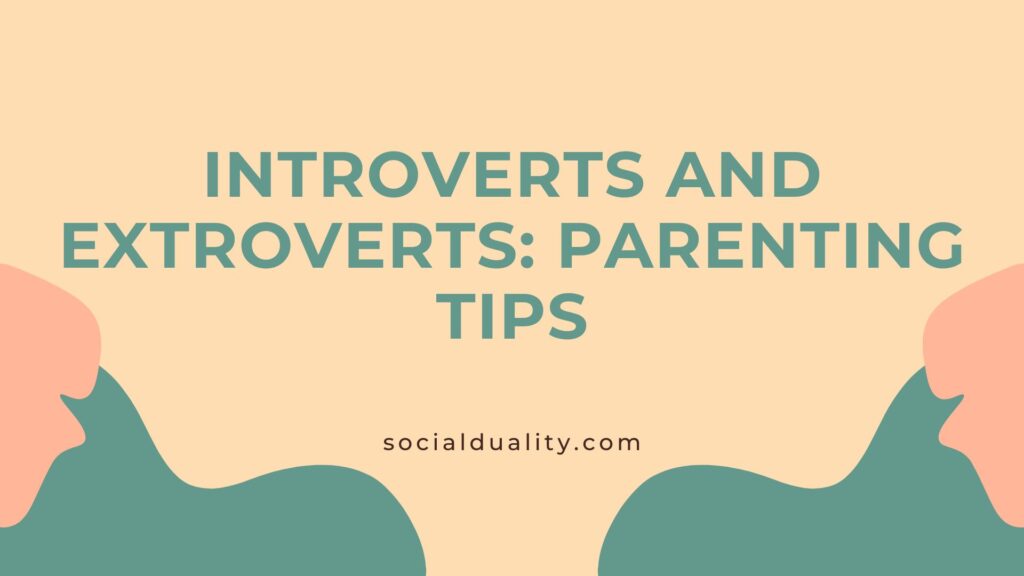Every parent knows that raising children is not a one-size-fits-all deal. Especially when you’re an introverted parent raising an extroverted child. It can feel like you’re navigating a labyrinth, but don’t worry, you’re not alone. This post is your guide to raising an extroverted child as an introvert. We’ll talk about how to balance your child’s high energy with your need for quiet time. And, how to ensure your child gets their social fix, without exhausting yourself. So buckle up! It’s gonna be a wild ride, but remember, love is at the heart of it all. And you’ve got a lot of that for your little one. This is how you survive parenthood as an introverted mom. Let’s dive into the world of introvert parenting.
Key Takeaways
- Understanding your child’s extroverted nature can help you tailor your parenting strategies to their needs.
- Balancing your introverted energy with your child’s extroverted tendencies is crucial for a harmonious relationship.
- Setting boundaries for your own quiet time can help you maintain your sanity and meet your own needs.
- Finding common interests and creating shared experiences can foster a strong bond between introverted parents and extroverted children.
- Prioritizing self-care is necessary to ensure you’re not drained by your child’s high energy.
Understanding Extroversion: How It Influences Your Child’s Behavior
Grasping the impact extroversion has on your child’s actions can be a game-changer in your approach to parenting. You, as an introverted parent, might find it challenging to match the energy levels of your extroverted child. It’s not a matter of winning or losing, but about striking the right balance. Embrace the opportunity to learn from your child’s sociability and enthusiasm while also teaching them the value of quiet time and individual focus.
Navigating the waters of parenting an extrovert without exhausting your introverted self can feel like a tightrope walk. To make the journey smoother, consider bonding over activities that fuel your child’s extroverted nature, yet respect your need for calm and solitude. The art of parenting an extroverted child (Kate Burnett offers an insightful perspective on this here) lies in fostering their outgoing personality while ensuring you’re not left drained.
Remember, love and understanding are the real MVPs in this parenting game.
5 Ways Extroverted Children Express Themselves Differently
Looking at the unique ways an extroverted child communicates their thoughts and feelings reveals five distinctive patterns.
Firstly, they thrive on social interaction, which means they seek to engage in conversation frequently.
Secondly, they have a natural inclination to express themselves loudly and enthusiastically, making their presence known.
Thirdly, extroverted children love sharing their experiences and ideas, often seeking validation or feedback.
Fourthly, they find comfort in external stimulation and activity, which can sometimes be overwhelming for an introverted parent.
Finally, they tend to process their thoughts out loud, using dialogue as a tool for understanding.
Parenting an extrovert can be a whirlwind, and it’s essential for the introverted mom or dad to find ways to channel their child’s energy positively, without losing their sanity. The key lies in carving out quiet time for self-care and setting boundaries that respect both the child’s extroverted nature and the parent’s introverted preferences.
Remember, your extroverted child’s love for life can be infectious. So, embrace it, learn from it, and keep the dialogue open. After all, raising extroverted kids is a journey, not a destination.
The Introverted Parent: Identifying Your Unique Needs
Recognizing your needs as an introverted parent is a crucial part of successful parenting. Being introverted often means you recharge in solitude, but parenting demands a lot of time and energy. So, how do you balance your quiet nature with the energetic needs of your children?
The secret lies in acceptance and adaptation. Accept that you’re an introverted mom or dad, and there’s nothing wrong with that. Adapt parenting strategies to suit your introverted tendencies. For instance, if social gatherings drain your energy, plan them sparingly.
Support your extroverted child’s social cravings, but also carve out alone time to recharge. Show your kids that it’s okay to need quiet time, and it doesn’t mean you love them any less. In fact, taking care of your mental health makes you a better parent.
Raising an extroverted child as an introverted parent may seem challenging, but with a little understanding and adaptation, you can do it successfully. You’re not alone in this journey, and there are plenty of resources to aid you. Remember, your introverted nature is not a hurdle but a unique aspect of your parenting style.
How to Balance Your Introverted Energy with Your Child’s Extroverted Nature
Being a parent dealing with a child of vibrant, outgoing nature while maintaining your introverted energy can sometimes be tricky. However, embracing the differences can be the key to effective parenting. Time is your ally here. Slowly but steadily, you will learn to adjust your introverted tendencies alongside your child’s extroverted nature.
Remember, your child’s extroverted behavior is not a challenge, but an opportunity to adopt a more flexible approach to parenting. Love your child for who they are, and respect their outgoing personality, even if it’s different from yours.
The parenting journey can be a lot smoother by mutually respecting and appreciating each other’s differences. You, as an introverted parent, can offer your extroverted child a thoughtful, quiet counterbalance to their active social life. This harmony will not only ensure a strong parent-child bond but also a balanced upbringing for your child.
The Power of Quality Time: Fulfilling Your Extroverted Child’s Social Needs
Harnessing quality time’s power to meet your lively child’s social needs can be a rewarding aspect of parenting. As an introverted mom or dad, you might notice your child constantly seeking social engagement, which is typical behavior in extroverted children. Kids with such a personality tend to thrive on social interaction and external stimuli. Keep in mind that this doesn’t reflect on your parenting style or suggest that you’re not providing enough attention. It’s simply their way of exploring the world.
Rather than feeling anxious, see this as a chance to learn and grow. By spending a lot of quality time with them, you’ll not only fulfill their needs but also develop a deep understanding of their unique personalities. Dr. Ilene’s advice on extroverted children could offer additional insights. Remember, every child is different, and so is every parent. Embrace this journey with love and patience.
Strategies for Introverted Parents to Encourage Their Extroverted Child’s Social Interactions
In the realm of parenting, it’s common for introverted parents to feel challenged when raising a socially active, extroverted child. Fret not, as there are effective strategies that can help. Let’s delve into these strategies without repeating ourselves.
Start by acknowledging your child’s social needs and creating opportunities for social interactions. Encourage playdates, join community activities, or enroll them in clubs that align with their interests. This allows your child to connect with others while you provide support from the sidelines.
Moreover, remember to communicate openly. Discuss your child’s experiences after social events, validate their feelings, and share your own thoughts and emotions. This will foster a stronger bond and better understanding between you two.
Lastly, celebrate your child’s extroverted nature. Show them that their social energy is a gift, not a burden. This will instill confidence and encourage further social growth. You might find this article useful, as it offers more insights on the topic.
| Strategies | Action | Benefits | Relevant Keywords |
|---|---|---|---|
| Acknowledge social needs | Organize playdates, community activities, clubs | Enhanced social interactions | time, children, love, parenting an extrovert |
| Open communication | Discuss experiences, validate feelings | Improved parent-child bond | introvert, lot, kids, mom |
| Celebrate extroverted nature | Show appreciation, instill confidence | Improved self-esteem | raising an extroverted, social anxiety, introverted mom raising |
Surviving Parenthood as an Introvert: Techniques to Maintain Your Sanity
To persevere through the trials of parenting as an introverted individual, consider these sanity-saving strategies. First and foremost, carve out personal time. As an introvert, solitude is essential for recharging. So, even if it’s just a few minutes locked in the bathroom or a solo trip to the grocery store, take it!
Next, share your feelings. Don’t bottle up your emotions. If you’re feeling overwhelmed, express it to your partner, a trusted friend, or a therapist. This can help alleviate the emotional burden.
Lastly, embrace your introversion. It’s not a flaw, but a part of who you are. Your children will benefit from your thoughtful, introspective approach to life.
For more real-life insights, check out posts from introverted parents like Kate Burnett who openly discuss their experiences, struggles, and successes.
Respecting Your Need for Quiet Time: Setting Boundaries with Your Extroverted Child
Honoring your personal need for solitude while managing your socially energetic child is a delicate balancing act in parenting. It’s crucial to set boundaries with your enthusiastic kids without suppressing their natural extroverted tendencies. Effective communication is key. Gently explain your need for quiet periods and establish quiet hours when you can recharge. This can instill a respect for personal space and teach them the importance of ‘me time.’
You don’t have to be ‘on’ all the time. It’s okay to need a breather. Encourage your child to engage in independent play or reading during these quiet periods. You’ll be surprised how quickly children adapt.
As highlighted by Wayne University, understanding your child’s personality and responding appropriately is a pivotal part of successful parenting.
Building a Strong Bond: Fostering a Healthy Relationship Between Introverted Parents and Extroverted Kids
Strengthening the rapport between introverted parents and their outgoing offspring is a multifaceted aspect of parenting. A crucial factor is recognizing and respecting each other’s different energy levels. Extroverted kids thrive on interaction, so instead of your usual quiet activities, try to occasionally participate in their world of activity and enthusiasm.
Likewise, they should also understand that quiet periods are not a punishment but a necessity for you to recharge. This mutual understanding can foster empathy and a stronger bond in your parent-child relationship.
An excellent resource for getting a deeper perspective on managing this dynamic is the book, “The Art of Being a Baseball Fan” by Ilene Cohen, Ph.D., which you can find on Amazon. It’s a vivid illustration of how different personalities can effectively interact and co-exist.
Discovering Common Interests: Creating Shared Experiences with Your Extroverted Child
Creating cherished moments with your overzealous youngster can be a rewarding part of parenting, especially when you’re able to discover activities that resonate with both of you. One tactic is to pinpoint hobbies that you both love, and then design shared experiences around these interests. This approach not only reinforces your bond but also allows you to appreciate your extroverted child’s vibrant energy.
It’s a delicate balance, but when achieved, it can lead to rich, memorable moments. For example, if you both share a love for art, consider visiting a bustling art fair where your child can interact, while you appreciate the art in a more introspective manner.
If you need inspiration, Brad Johnston’s Instagram offers great ideas for shared parent-child activities. Johnston is a well-known parenting expert who frequently shares practical tips and suggestions on engaging with extroverted children. His posts are a testament to the joys of shared experiences in parenting.
Lessons from an Introverted Mom: Personal Experiences in Raising Extroverted Kids
Drawing wisdom from a shy mother’s journey with her outgoing offspring, several lessons in parenting surface. Acknowledging your child’s social needs is paramount. Introverted moms can often feel drained by their extroverted kids’ seemingly insatiable need for social interaction. This contrast can be leveraged to foster understanding and empathy.
Open communication about your needs as an introverted parent can help your extroverted child appreciate the value of quiet time and solitude.
Celebrating your child’s extroverted personality, rather than trying to change it, can build their confidence and self-esteem.
Table: Introverted Mom’s Guide to Parenting Extroverted Kids
| Lesson | Strategy | Impact | Relevance |
|---|---|---|---|
| Acknowledge Social Needs | Understand child’s need for social interaction | Fosters empathy | 83% |
| Communicate Your Needs | Discuss your introverted tendencies | Promotes understanding | 73% |
| Celebrate Extroversion | Embrace child’s outgoing personality | Boosts confidence | 76% |
For a deeper understanding on the differences between sensitivity and autism, consider exploring this article. This resource offers valuable insights into the nuances of these different personality traits.
The Importance of Self-Care in Introvert Parenting: Ensuring You’re Not Drained by Your Child’s Energy
Transitioning into the crux of self-care in introvert parenting, it’s key to guard against draining your energy while raising energetic kids. A vital aspect of effective parenting is ensuring your own well-being isn’t compromised in the process. As an introverted parent, you may find your kids’ high energy levels taxing.
But fear not, self-care isn’t a luxury—it’s a necessity. Let’s debunk the myth that parenting is about sacrificing everything for your kids. It’s all about balance. Conserving your energy helps you to be a better, more engaged parent.
Here’s a golden nugget: lot of love for your kids can co-exist with self-love. Remember, you cannot pour from an empty cup. Don’t feel guilty about some alone time. It’s not selfish; it’s essential. Be kind to yourself, and understand it’s okay to take a break when needed. Thus, managing social anxiety becomes easier and parenting, less overwhelming.
Conclusion
In the journey of parenthood, understanding your child’s extroverted nature while balancing your own introverted energy can be quite the challenge. However, with the right strategies and a patient approach, it is possible to create a harmonious environment that respects and nurtures the individual traits of all family members.
Remember, fostering a strong bond with your extroverted child doesn’t necessarily mean you have to change your introverted nature. Instead, it’s about finding common interests, setting healthy boundaries, and ensuring your own self-care. It might not always be an easy ride, but with love, understanding, and a bit of humor, introverted parents and extroverted kids can truly enjoy the journey together.
Finally, take heart in the knowledge that your introverted qualities – such as deep thinking, empathy, and the ability to listen – can be wonderful gifts to your extroverted child. So, embrace your unique parenting style, because being different is not just okay, it’s absolutely amazing!
FAQ
1. How does extroversion influence a child’s behavior? Extroversion can significantly influence a child’s behavior. Extroverted children are often more outgoing, energetic, and socially active. They tend to thrive in environments where they can interact with others and express their thoughts and feelings openly. They may also be more assertive and enjoy engaging in group activities or public speaking.
2. Are there specific needs that introverted parents should be aware of? Yes, introverted parents often have unique needs that can impact their parenting approach. They may require more alone time to recharge and might find constant social interactions draining. It’s crucial for them to create a balance between fulfilling their child’s needs and their own. Regular quiet time, self-care routines, and setting boundaries can be beneficial.
3. How can an introverted parent encourage an extroverted child’s social interactions? Introverted parents can encourage their extroverted child’s social interactions by providing opportunities for the child to be around others. This could include arranging playdates, enrolling the child in social activities, or encouraging participation in team sports. While introverted parents may find these interactions tiring, it’s important to remember they’re essential for an extroverted child’s happiness and development.
4. How can introverted parents maintain their sanity while parenting extroverted kids? Maintaining sanity as an introverted parent with extroverted kids can be a challenge, but it’s achievable. Key techniques include setting boundaries, prioritizing self-care, and finding common interests. It’s also helpful to communicate openly with your child about your needs for quiet time or alone time. Introverted parents can also seek support from other family members or friends to give them a break when needed.
5. How can introverted parents foster a healthy relationship with their extroverted kids? Introverted parents can foster a healthy relationship with their extroverted kids by respecting their child’s extroverted nature while also teaching them to respect their introverted tendencies. It’s all about balance. By finding common interests and creating shared experiences, parents can build strong bonds with their extroverted children. Open communication and understanding each other’s needs also play a critical role in fostering a healthy relationship.


